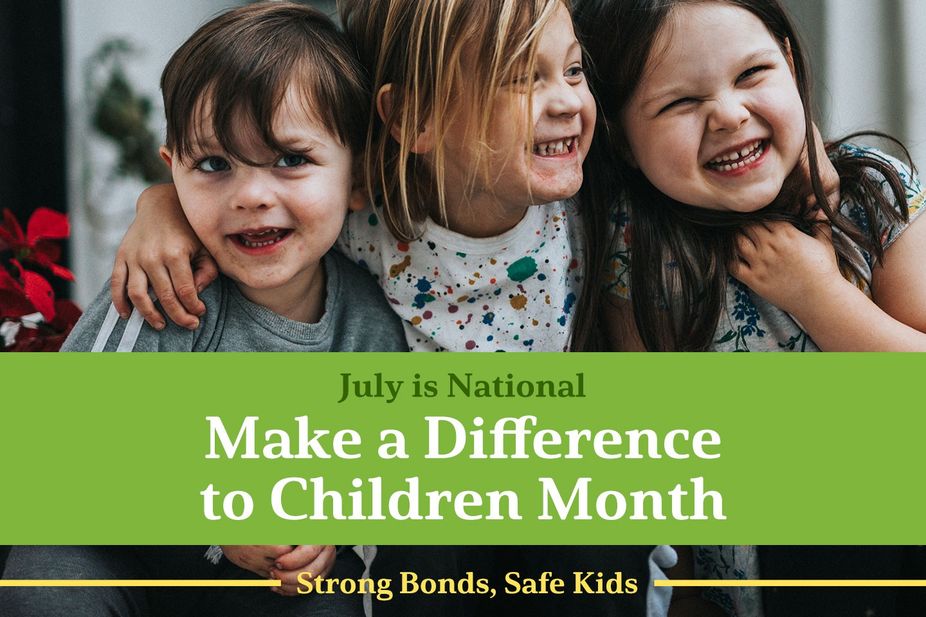July is National Make a Difference to Children Month. This is a powerful reminder of our collective responsibility to support and nurture the well-being of our children. Throughout the month, individuals, communities, and organizations including Libertas Home will come together to create positive change and make a lasting impact on the lives of children. It is a time to reflect on the importance of investing in our children’s futures and to take action towards building a society that values and uplifts every child.
Sad but awakening statistics: only last year, NCMEC received more than 19,000 reports of possible child sex trafficking. Human trafficking generally affects between 150 to 300 victims every year. In Virginia alone, the number of cases increased by 17% from 2020 to 2021.
The power of small actions yields big results! It is only with your help that we make a difference. In our next few blogs, we will cover three aspects of how we can contribute to child protection such as awareness about trafficking signs, taking action on child online safety and tactics to build better trust between parents and children.
What is child trafficking?
Child trafficking involves the recruitment, transportation, transfer, harboring, or receipt of children for the purpose of exploitation. It is a form of modern-day slavery, where children are forced into various forms of labor, such as domestic work, agricultural labor, or forced into the commercial sex trade. These vulnerable young individuals are robbed of their childhood, their innocence, and their future.
Recognizing the Signs of Child Trafficking
1. Sudden changes in behavior or appearance:
Administration for Children & Families study shows that trauma from being a victim of trafficking can lead to a wide range of mental or behavioral health changes. These behavioral changes may include withdrawal from family and friends, increased secrecy, depression, anxiety, fearfulness, hyperarousal, aggression, or a sudden shift in personality. These kids may also undergo drastic changes in physical appearance, such as weight loss, malnutrition, or signs of physical abuse.
2. Frequent absences from school or other activities:
Trafficked children are often kept away from school or any regular activities. They may have irregular attendance, excessive tardiness, or drop out altogether. These absences may be accompanied by vague explanations or constant changing of schools.
3. Inability to speak freely or appear overly controlled:
Trafficked children may exhibit signs of fear, anxiety, or an inability to speak openly. They may appear to be under strict control or accompanied by someone who seems to exert power over them. They may also lack personal identification documents or have forged ones.
4. Lack of knowledge about their whereabouts:
Children who have been trafficked may not have a clear understanding of their current location or address. They may provide inconsistent or evasive responses when questioned about where they live or who they live with.
5. Involvement in commercial sex or labor exploitation:
One of the most apparent signs of child trafficking is the involvement of a child in commercial sex or labor exploitation which is statistically as high as 80 % . They may be forced to work in dangerous conditions, exploited for their labor, or coerced into engaging in sexual activities.
In July, during National Make a Difference to Children Month, it is crucial to recognize our collective responsibility in supporting and nurturing the well-being of children. This month serves as a reminder to take action and create positive change in the lives of children. With alarming statistics revealing the prevalence of child sex trafficking, it is evident that urgent measures are needed. By increasing awareness of trafficking signs, promoting child online safety, and fostering trust between parents and children, we can contribute to child protection. Child trafficking involves the exploitation of vulnerable children, depriving them of their childhood, innocence, and future. Recognizing signs such as sudden behavioral changes, frequent absences from activities, restricted speech, lack of knowledge about their whereabouts, and involvement in commercial sex or labor exploitation is crucial. Together, we can make a lasting impact and build a society that values and uplifts every child.

